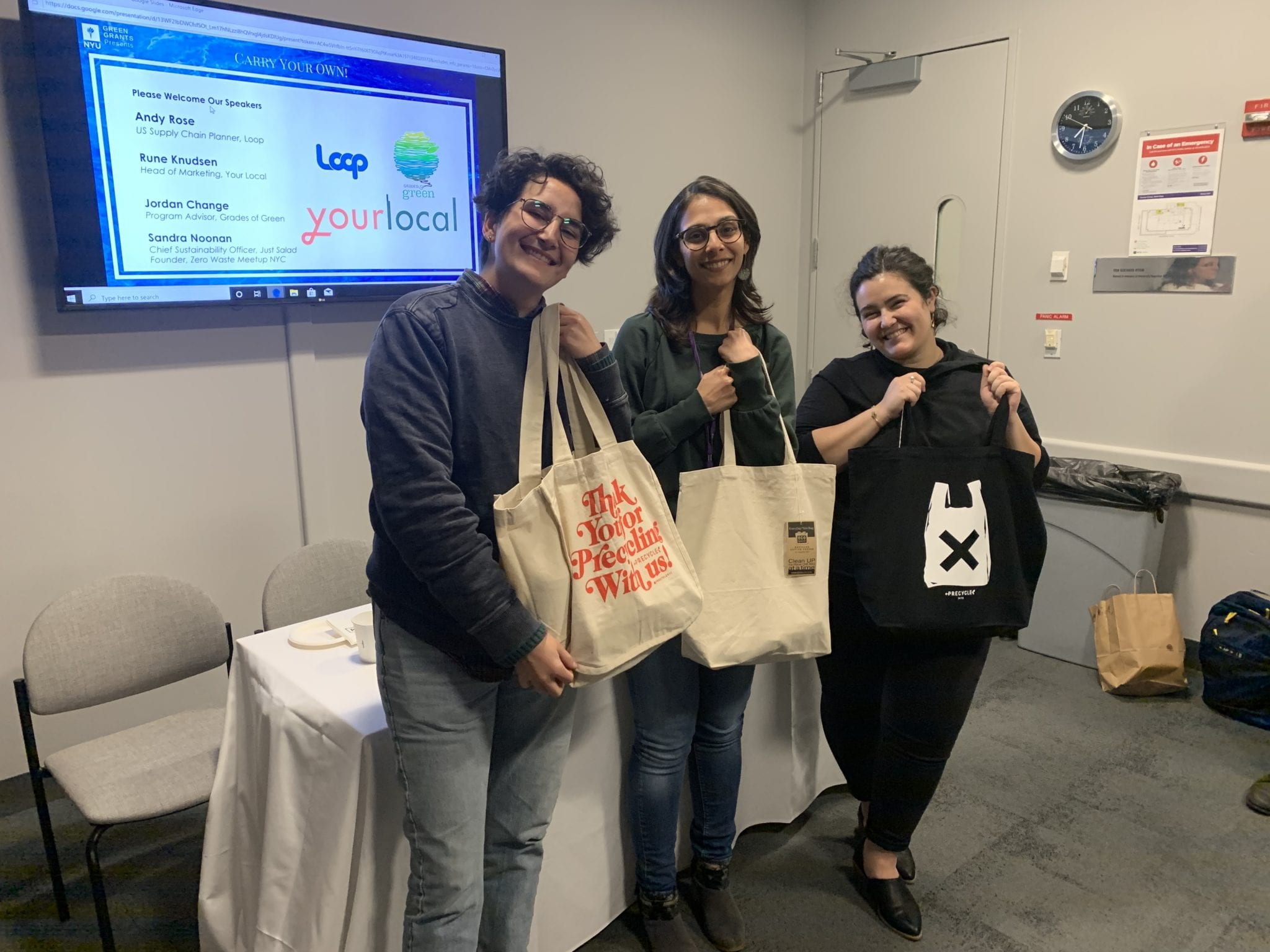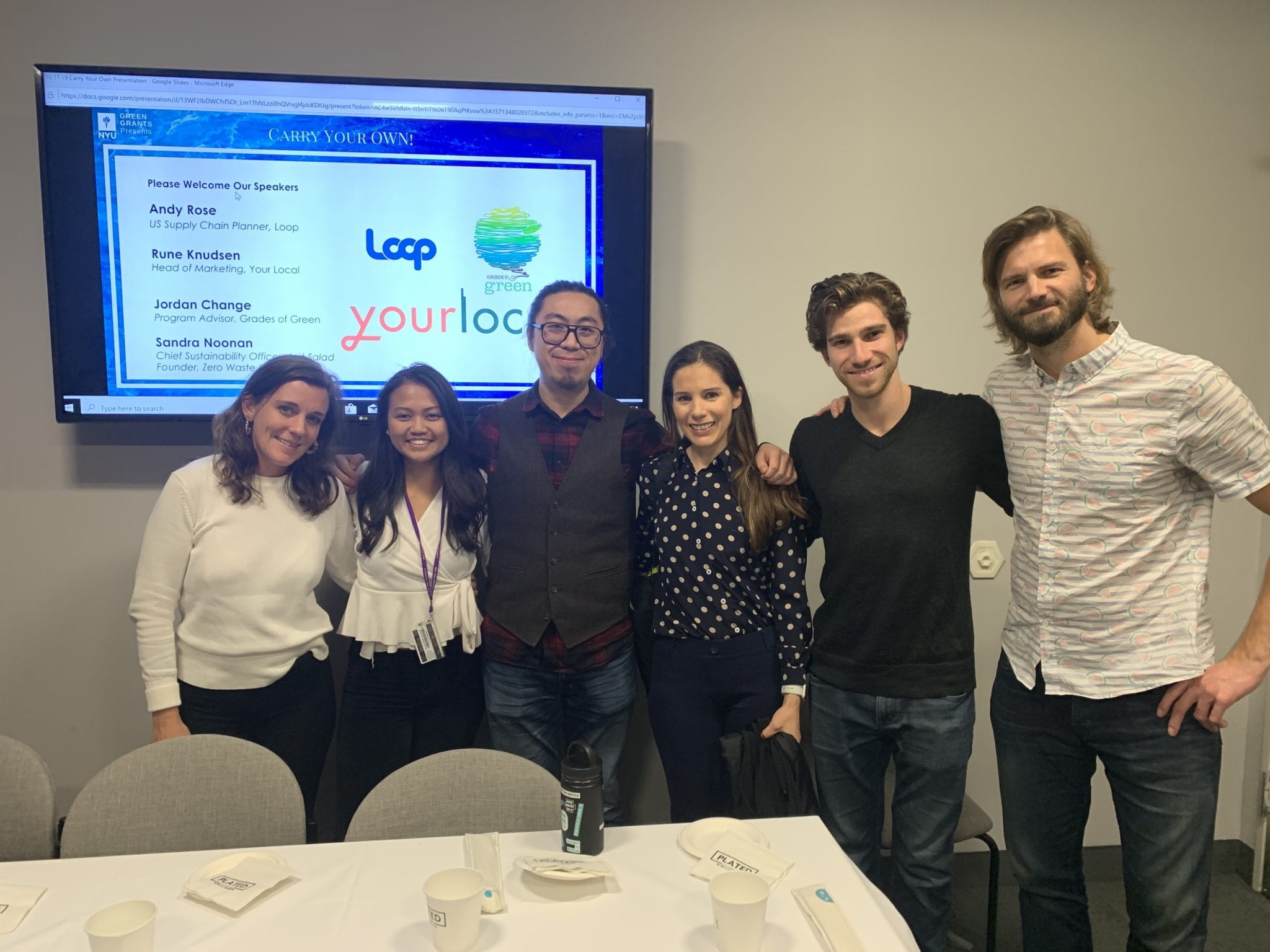Written by Sarah Dietz
 The Carry Your Own! (CYO) Challenge officially came to a close on Thursday October 17th, culminating with a celebratory evening awarding the top three plastic waste mitigators for their efforts. (If you are unfamiliar with the CYO challenge, please visit the first blog post to learn more.) Winners were presented with reusable tote bags filled with generous prizes. In the totes were hundreds of dollars’ worth of low-waste lifestyle prizes, including gift cards to Precycle, NYC’s first package free grocery store. These awesome gifts were made possible largely due to donations from local, low-waste lifestyle companies, Precycle and Your Local. The winners were selected based on their level of participation in the three-week challenge, which asked them to eliminate as much personal plastic waste as possible, mainly through two items commonly used by students on campus; coffee mugs and utensils. The contest was judged by an NYU student who chose the winners based on quantity of posts about their challenge experience.
The Carry Your Own! (CYO) Challenge officially came to a close on Thursday October 17th, culminating with a celebratory evening awarding the top three plastic waste mitigators for their efforts. (If you are unfamiliar with the CYO challenge, please visit the first blog post to learn more.) Winners were presented with reusable tote bags filled with generous prizes. In the totes were hundreds of dollars’ worth of low-waste lifestyle prizes, including gift cards to Precycle, NYC’s first package free grocery store. These awesome gifts were made possible largely due to donations from local, low-waste lifestyle companies, Precycle and Your Local. The winners were selected based on their level of participation in the three-week challenge, which asked them to eliminate as much personal plastic waste as possible, mainly through two items commonly used by students on campus; coffee mugs and utensils. The contest was judged by an NYU student who chose the winners based on quantity of posts about their challenge experience.
A big part of this second event was a lively panel discussion about sustainability in the food and packaging industries. Yvonne and I welcomed leaders from local businesses Just Salad and Loop U.S. to discuss and answer questions about plastic packaging waste. Representatives from Your Local, a food recovery app, and Grades of Green, an educational organization, were also part of the panel.
 The larger goal of this project is to help contribute to a culture of low waste at NYU. The school has already stopped distributing plastic straws and single use bags at dining halls and has also committed to eliminating plastic water bottles by January 2020. We love the low-waste culture these policies are helping to create, and we are hoping that we can encourage students to do the same with their own plastic cutlery, coffee mugs, plastic bags, etc. If this project were given the opportunity to continue, we would love to see the CYO! Challenge become part of the Office of Sustainability’s Zero Waste Week. We found that these educational events were an exciting way to expose more of the NYU community to waste issues, get people talking and connecting about these issues, and help to foster meaningful partnerships and connections with local organizations already doing great work in this space. The people who attended our events were already fairly knowledgeable about plastic waste in general but based on the results from the surveys we took, as well as discussions had during events, people reported feeling more motivated to continue this change of using less after attending and participating. Over 80% of respondents said they felt more knowledgeable after the three weeks were over, and over 70% said they are extremely likely to continue the habit of carrying their own reusable everyday items!
The larger goal of this project is to help contribute to a culture of low waste at NYU. The school has already stopped distributing plastic straws and single use bags at dining halls and has also committed to eliminating plastic water bottles by January 2020. We love the low-waste culture these policies are helping to create, and we are hoping that we can encourage students to do the same with their own plastic cutlery, coffee mugs, plastic bags, etc. If this project were given the opportunity to continue, we would love to see the CYO! Challenge become part of the Office of Sustainability’s Zero Waste Week. We found that these educational events were an exciting way to expose more of the NYU community to waste issues, get people talking and connecting about these issues, and help to foster meaningful partnerships and connections with local organizations already doing great work in this space. The people who attended our events were already fairly knowledgeable about plastic waste in general but based on the results from the surveys we took, as well as discussions had during events, people reported feeling more motivated to continue this change of using less after attending and participating. Over 80% of respondents said they felt more knowledgeable after the three weeks were over, and over 70% said they are extremely likely to continue the habit of carrying their own reusable everyday items!
Interested in becoming part of the many solutions to reduce climate change and mitigate your own personal plastic waste? Check out Project Drawdown, Zero Waste NYC meetup, Surfrider NYC Chapter, Oceanic Global, and Lonely Whale, to name a few!
Sarah Dietz is a recent graduate of the Steinhardt Food Studies program, where she earned her M.A. in May of 2019. She has nearly a decade of professional experience investigating food related issues, focusing on health, food quality, garden education, and sustainability. She was born and raised in New England, moved to NYC while pursuing her master’s, and now lives in Portland, Maine. Sarah’s current research addresses sustainable entrepreneurship and the food system’s connection to ocean health. She is active with her local Surfrider chapter and is dedicated to teaching others how to take better care of the environment through food choices and other daily habits.
NYU Green Grants are awarded to improve the university’s operational environmental performance, foster environmental literacy and community engagement, advance applied research and design, and demonstrate the viability of best practices and technologies for sustainability. The Green Grants Selection Committee awards up to $20,000 for the most feasible, impactful, and innovative projects that have potential for institutionalization on campus or are self-sustaining.
